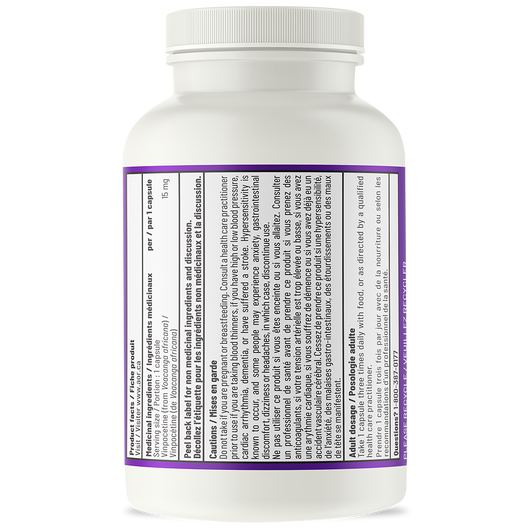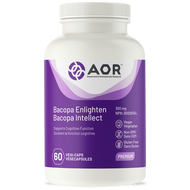Description
AOR Vinpo 15 - 90 Veg Capsules:
Supports Optimal Brain Function.
A modified extract from the seeds of an African berry tree. Improves cognitive and neurological function. Supports visual health and hearing. Delivers a clinically effective dose of vinpocetine
Vinpo-15 is vinpocetine (ethyl apovincamine), an alkaloid originally identified in periwinkle (Vinca minor). Vinpocetine helps support brain function and cognitive health.
Vinpocetine is a modified compound originally found in the periwinkle plant (Vinca minor) that helps support brain function and cognitive health. Like the well-known botanical, Ginkgo biloba, vinpocetine supports blood flow, oxygen and nutrient delivery to the brain; unlike ginkgo, it does so without reducing blood flow elsewhere in the body. Studies in red blood cells and damaged neurons show that vinpocetine directly increases ATP levels in these cells, supporting optimal brain energy levels. In addition, vinpocetine’s blood thinning effects are far less potent than those of ginkgo, making it a much safer compound. One study showed that vinpocetine helped reduce tinnitus and hearing loss after exposure to loud noises, and research suggests that it may also enhance circulation in the eyes.
Vinpo-15 is an excellent alternative for those who want the health benefits of Ginkgo biloba, but who are concerned about its blood thinning effects. Vinpo-15 is a good choice for those looking to support their memory and brain function with age, as well as those with a family history of stroke. Vinpo-15 may also improve eye health and tinnitus.
Supplement Facts:
| Each Capsule Contains: | |
| Vinpocetine | 15 mg |
Non-Medicinal Ingredients: microcrystalline cellulose. Capsule: hypromellose.
AOR guarantees that all ingredients have been declared on the label. Contains no wheat, gluten, corn, nuts, peanuts, sesame seeds, sulphites, mustard, soy, dairy, eggs, fish, shellfish or any animal byproduct.
Suggested Dose: (Adult): Take 1 capsule three times daily with food, or as directed by a qualified health care practitioner.
Cautions : Do not take if you are pregnant or breastfeeding. Consult a healthcare practitioner prior to use if you are taking blood thinners, if you have high or low blood pressure, cardiac arrhythmia, dementia, or have suffered a stroke. Hypersensitivity is known to occur, and some people may experience anxiety, gastrointestinal discomfort, dizziness or headaches, in which case, discontinue use.
Source: Voacanga africana seed
Main Applications:
Cerebral circulation.
Hearing function.
Kidney function.
Eye health.
Research:
Stroke Deficits and Dementia: Many clinical trials have demonstrated Vinpocetine’s ability to support brain function. Most of these trials have been performed in stroke victims, but research also supports Vinpocetine’s positive impact on cognitive function in organic dementias and in normal, healthy adults.
A meta-analysis of seven double-blind clinical trials involving a total of 731 people suffering from age-related dementias or cognitive deficits following a stroke found that Vinpocetine improved cognitive and neurological function on a wide variety of measures, including scores tests of memory and mental function like the Sandoz Clinical Assessment-Geriatric (SCAG) and the Mini-Mental Status Questionnaire (MMSQ), neurological symptoms such as coordination and repetitive speaking patters (palilalia), and overall functional status as evaluated using the Clinical Global Impression (CGI) scale. Furthermore, there were no serious side effects related to Vinpocetine use. Overall, the investigators concluded, the results of these trials prove that patient users of Vinpocetine “become more vivid, the cognitive performance improves, and the daily activity is more intense.”
Reduced Cerebral Blood Flow: One recent long-term observational study examined the safety of 30 mg oral vinpocetine per day for 90 days on 4865 patients with chronic cereobrovascular insufficiency with arterial hypertension. The dose was well tolerated, and their neurological symptoms improved as did their MMSE (mini-mental status exam) score.
Tympanophonia: In addition, vinpocetine’s therapeutic potential in hearing trouble is of interest. In one study, vinpocetine was given to fifty patients with chronic neurosensory hearing loss, and at least 80% experienced reduced tympanophonia. More elaborate clinical trials are warranted.
References:
- Afon’kin VIu, Dobretsov KG, Sipkin AV. [The new scheme of cavinton application to the treatment of chronic neurosensory loss of hearing]. Vestn Otorinolaringol. 2009;(6):69-70.
- Balestreri R, Fontana L, Astengo F. A double-blind placebo controlled evaluation of the safety and efficacy of vinpocetine in the treatment of patients with chronic vascular senile cerebral dysfunction. J Am Geriatr Soc. 1987 May;35(5):425-30.
- Chukanova EI. [Efficacy of cavinton in the treatment of patients with chronic blood flow insufficiency. Russian multicenter clinical-epidemiological program "CALIPSO"]. Zh Nevrol Psikhiatr Im S S Korsakova. 2010;110(12):49-52.
- Fischhof PK, Moslinger-Gehmayr R, Herrmann WM, et al. Therapeutic efficacy of vincamine in dementia. Neuropsychobiology. 1996;34(1):29-35.
- Kahan A, Olah M. Use of ethyl apovincaminate in ophthalmological therapy. Arzneimittelforschung. 1976;26(10a):1969-72.
- Kiss B, Karpati E. Mechanism of action of vinpocetine. Acta Pharm Hung. 1996 Sep;66(5):213-24.
- Konopka W, Zalewski P, Olszewski J, et al. Treatment results of acoustic trauma. Otolaryngol Pol. 1997;51 Suppl 25:281-4.
- Molnar P, Gaal L, Horvath C. The impairment of long-term potentiation in rats with medial septal lesion and its restoration by cognition enhancers. Neurobiology (Bp). 1994;2(3):255-66.
- Nagy Z, Vargha P, Kovács L, Bönöczk P. Meta-analysis of Cavinton. Praxis. 1988 Sep; 7(9):63-8.
- Pliushko DG, Sobko EG. Drug therapy of initial open-angle glaucoma. Oftalmol Zh. 1989;(2):72-4.
- Subhan Z, Hindmarch I. Psychopharmaco-logical effects of vinpocetine in normal healthy volunteers. Eur J Clin Pharmacol. 1985;28(5):567-71.
- Ueyoshi A, Ota K. Clinical appraisal of vinpocetine for the removal of intractable tumoral calcinosis in haemodialysis patients with renal failure. J Int Med Res. 1992 Sep;20(5):435-43.












